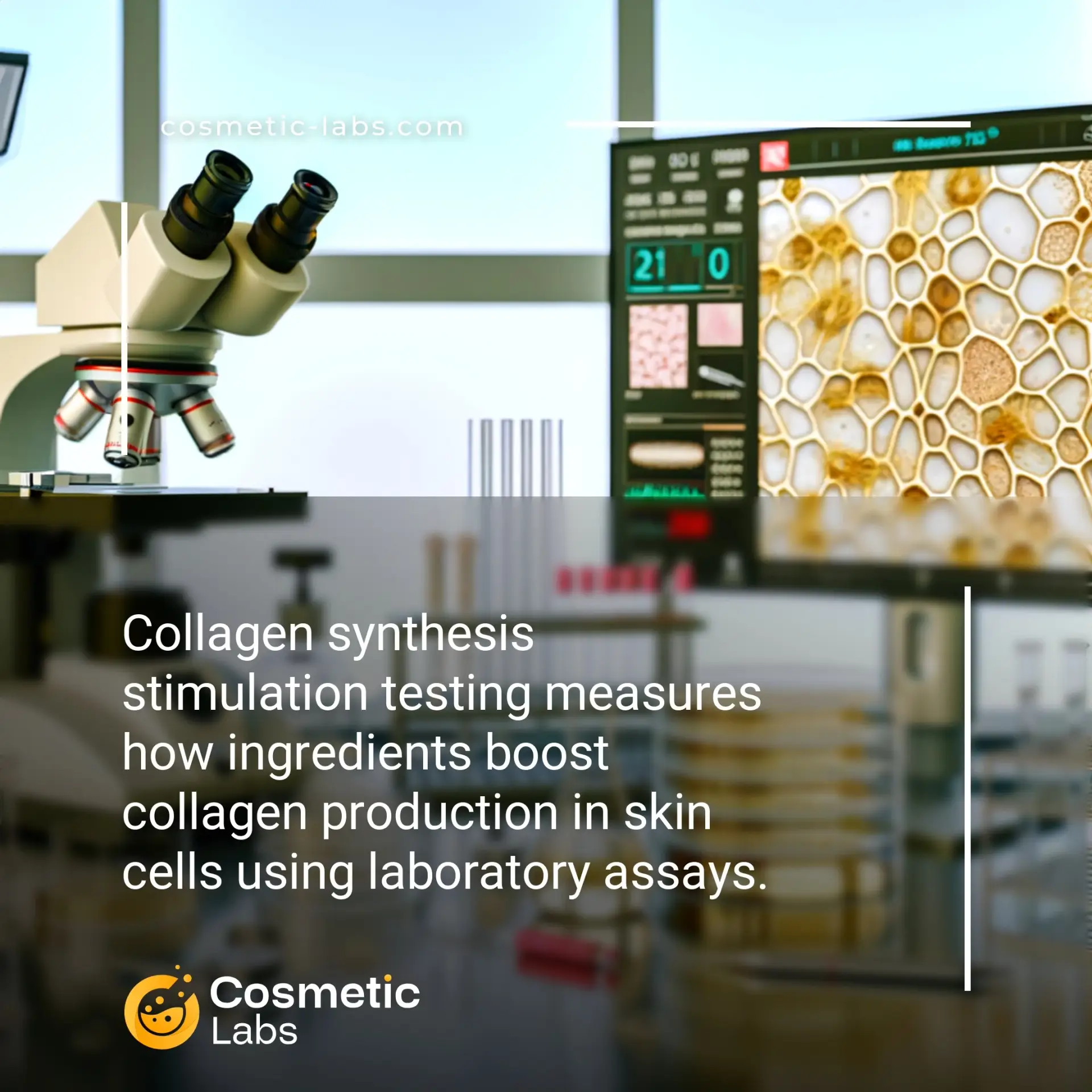Collagen Synthesis Testing Services for Anti-Aging Products

What is Collagen synthesis stimulation testing?
Collagen synthesis stimulation testing is a laboratory method that measures how effectively anti-aging ingredients boost natural collagen production in skin cells. Labs use fibroblast cell cultures to test your formulations, exposing them to specific compounds and measuring collagen output through biochemical assays. This testing reveals whether your active ingredients actually trigger the cellular mechanisms that rebuild skin structure, giving you concrete data to support anti-aging claims before market launch.
Why do you need this service?
Cosmetic labs use collagen synthesis stimulation testing to validate peptide serums, retinol formulations, and vitamin C products before market launch. This preclinical testing measures fibroblast activity and procollagen production rates, delivering quantifiable anti-aging claims that support marketing campaigns and regulatory submissions for your skincare line.
Who provides Collagen synthesis stimulation testing services?
All cosmetic labs providing Collagen synthesis stimulation testing services
There is no company providing these services at the moment.
Collagen Synthesis Stimulation Testing for Anti-Aging Services
Collagen synthesis stimulation testing validates how effectively your anti-aging formulations boost natural collagen production in skin cells. These specialized assays measure your product’s ability to trigger fibroblast activity and increase collagen gene expression, providing the scientific evidence needed for anti-aging claims.
In Vitro Collagen Production Assays
Labs use human dermal fibroblast cell cultures to test your formulations’ collagen-boosting potential. These cell-based assays measure procollagen synthesis rates and collagen deposition over 24-72 hour treatment periods. Testing protocols include:
- Procollagen Type I C-peptide quantification
- Hydroxyproline content analysis
- Real-time PCR for collagen gene expression
- Immunofluorescence imaging of collagen fibers
Results show percentage increases in collagen production compared to untreated controls, giving you concrete data for marketing claims.
Molecular Pathway Analysis
Advanced testing examines which signaling pathways your ingredients activate to stimulate collagen synthesis. Labs analyze TGF-β pathway activation, Smad protein phosphorylation, and transcription factor activity. This deeper analysis helps optimize formulations by identifying the most effective concentrations and ingredient combinations.
Testing typically includes dose-response curves from 0.1% to 5% active concentration. Labs also evaluate synergistic effects when multiple collagen-stimulating ingredients work together in your formulation.
Connect with specialized cosmetic labs on our platform to discuss collagen synthesis testing protocols that match your specific anti-aging product development needs.
Practical Applications of Collagen Synthesis Stimulation Testing
Cosmetic labs use collagen synthesis stimulation testing to validate anti-aging claims across multiple product categories and formulation strategies.
Peptide-Based Serum Development
Labs evaluate peptide combinations like palmitoyl pentapeptide-4 and copper tripeptide-1 through fibroblast cell culture assays. Testing protocols measure collagen I and III production increases over 72-hour exposure periods. Brand owners receive quantitative data showing 15-40% collagen synthesis improvements compared to untreated controls.
These studies support specific marketing claims about wrinkle reduction and skin firmness. Labs provide dose-response curves that guide optimal peptide concentrations for maximum efficacy without irritation.
Botanical Extract Validation
Testing facilities assess plant-derived actives like bakuchiol, centella asiatica, and marine collagen through standardized protocols. Labs measure procollagen synthesis markers and matrix metalloproteinase inhibition to demonstrate anti-aging potential. Results typically show 20-60% increases in collagen production within 48-96 hours.
This data helps formulators select effective botanical concentrations and supports regulatory submissions. Labs often test extract combinations to identify synergistic effects that enhance overall collagen stimulation.
| Testing Method | Measurement Parameter | Typical Timeline | Key Applications |
|---|---|---|---|
| Cell Culture Assay | Collagen I/III synthesis | 48-72 hours | Peptide serums, retinol alternatives |
| Gene Expression Analysis | COL1A1, COL3A1 mRNA levels | 24-48 hours | Botanical extracts, growth factors |
| Protein Quantification | Procollagen markers | 72-96 hours | Moisturizers, anti-aging creams |
| Enzyme Activity | MMP-1 inhibition | 24-72 hours | Sun protection, environmental defense |
Ready to validate your anti-aging formulations? Contact specialized cosmetic labs on our platform to discuss collagen synthesis testing protocols tailored to your specific product development needs.
